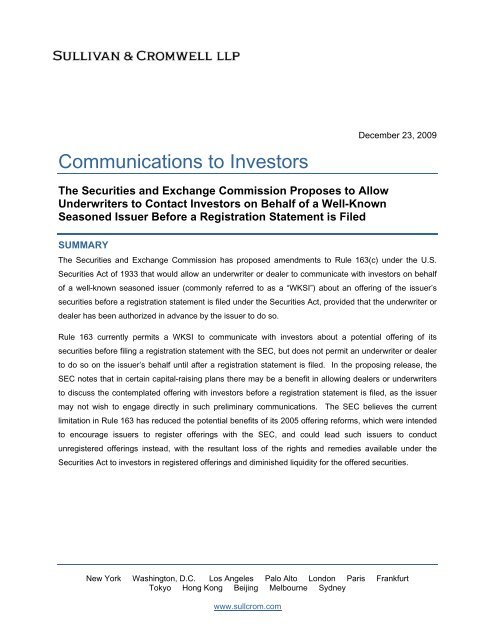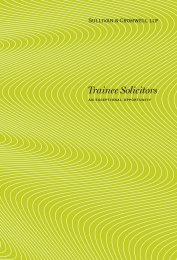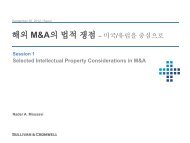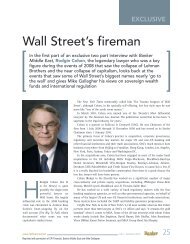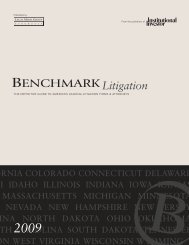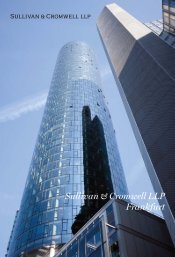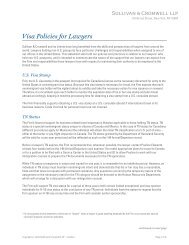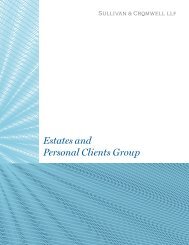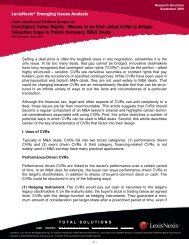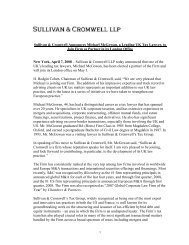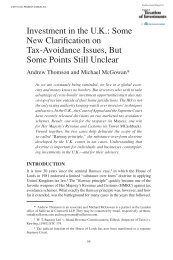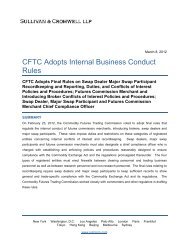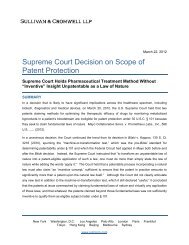Download Full PDF - Sullivan & Cromwell
Download Full PDF - Sullivan & Cromwell
Download Full PDF - Sullivan & Cromwell
Create successful ePaper yourself
Turn your PDF publications into a flip-book with our unique Google optimized e-Paper software.
Communications to Investors<br />
December 23, 2009<br />
The Securities and Exchange Commission Proposes to Allow<br />
Underwriters to Contact Investors on Behalf of a Well-Known<br />
Seasoned Issuer Before a Registration Statement is Filed<br />
SUMMARY<br />
The Securities and Exchange Commission has proposed amendments to Rule 163(c) under the U.S.<br />
Securities Act of 1933 that would allow an underwriter or dealer to communicate with investors on behalf<br />
of a well-known seasoned issuer (commonly referred to as a “WKSI”) about an offering of the issuer’s<br />
securities before a registration statement is filed under the Securities Act, provided that the underwriter or<br />
dealer has been authorized in advance by the issuer to do so.<br />
Rule 163 currently permits a WKSI to communicate with investors about a potential offering of its<br />
securities before filing a registration statement with the SEC, but does not permit an underwriter or dealer<br />
to do so on the issuer’s behalf until after a registration statement is filed. In the proposing release, the<br />
SEC notes that in certain capital-raising plans there may be a benefit in allowing dealers or underwriters<br />
to discuss the contemplated offering with investors before a registration statement is filed, as the issuer<br />
may not wish to engage directly in such preliminary communications. The SEC believes the current<br />
limitation in Rule 163 has reduced the potential benefits of its 2005 offering reforms, which were intended<br />
to encourage issuers to register offerings with the SEC, and could lead such issuers to conduct<br />
unregistered offerings instead, with the resultant loss of the rights and remedies available under the<br />
Securities Act to investors in registered offerings and diminished liquidity for the offered securities.<br />
New York Washington, D.C. Los Angeles Palo Alto London Paris Frankfurt<br />
Tokyo Hong Kong Beijing Melbourne Sydney<br />
www.sullcrom.com
The SEC is soliciting comments on the proposed amendments. 1<br />
January 27, 2010.<br />
The deadline for comments is<br />
BACKGROUND<br />
In 2005, the SEC adopted various modifications to the registration, communications and offering<br />
requirements under the Securities Act. As part of those modifications, the SEC liberalized the<br />
communications rules for a new category of issuers, called “well-known seasoned issuers” (“WKSIs”). 2<br />
The new rules also permitted WKSIs to file registration statements that become effective automatically<br />
upon filing, without SEC review.<br />
Pursuant to Rule 163, WKSIs can engage in unrestricted oral and written offers before a registration<br />
statement is filed without violating the “gun-jumping” provisions of the Securities Act (i.e., provisions<br />
restricting communications relating to public offerings in the absence of a filed registration statement).<br />
Rule 163 exempts an offer made “by or on behalf of” a WKSI from these restrictions as long as the<br />
conditions of the rule are met. Under the current rule, a communication is deemed to be “by or on behalf<br />
of” a WKSI if the issuer or an agent or representative of the issuer, other than an offering participant who<br />
is an underwriter or dealer, authorizes or approves the communication before it is made. At the time the<br />
SEC adopted the rule and permitted automatic shelf registration, it expected that a WKSI would usually<br />
have a shelf registration statement on file that it could use for any of its registered offerings, and that both<br />
the issuer as well as any underwriters would be able to communicate with investors without the need for<br />
an exemption such as Rule 163. In the release proposing the amendment, however, the SEC noted that,<br />
contrary to expectations, many WKSIs have not filed automatic shelf registration statements or have filed<br />
registration statements that do not register all of the types of securities they may want to offer. As a<br />
result, a WKSI that wants to contact investors about a potential offering may need to do so in accordance<br />
with Rule 163, and thus may not be permitted to have an underwriter or dealer make those contacts on its<br />
behalf.<br />
The SEC notes that some methods used in recent capital-raising transactions have highlighted<br />
impediments in Rule 163 to the ability of a WKSI to communicate with broader groups of potential<br />
investors regarding a possible offering of the issuer’s securities. Specifically, WKSIs may want to assess<br />
the level of investor interest in their securities before filing a registration statement (or a post-effective<br />
amendment to an existing registration statement) covering the offered securities. Although Rule 163<br />
1<br />
2<br />
Release No. 33-9098 (December 18, 2009).<br />
A WKSI is an issuer that meets the registrant requirements of Form S-3 or Form F-3; either (x) has at<br />
least $700 million in worldwide market value of outstanding voting and non-voting common equity<br />
held by non-affiliates or (y) with regard to issuers that will only register non-convertible securities<br />
(other than common equity) or certain full and unconditional guarantees, has issued, for cash, within<br />
the last three years at least $1 billion aggregate principal amount of non-convertible securities (other<br />
than common equity) through primary offerings registered under the Securities Act; and is not an<br />
“ineligible issuer” as defined in Securities Act Rule 405.<br />
Communications to Investors<br />
December 23, 2009<br />
-2-
currently allows these issuers to communicate directly with potential investors to determine their interest<br />
in purchasing securities without violating the “gun-jumping” provisions of the Securities Act, the SEC<br />
notes that many of these issuers either do not have sufficient knowledge about potential investors to<br />
contact them directly or may prefer not to contact investors directly out of concern that any such contact<br />
could itself constitute and reveal material, non-public information about the issuers’ capital-raising plans<br />
without the opportunity to first obtain a confidentiality agreement from the investors. 3 Thus, the SEC<br />
acknowledges that a WKSI may wish to engage underwriters or dealers to contact investors on its behalf,<br />
in order to benefit from the latter’s broad client base and to preserve confidentiality, and thus to better<br />
ascertain the depth and extent of market interest in a potential offering without adversely affecting the<br />
market for the issuer’s securities (e.g., by filing a registration statement and revealing its capital-raising<br />
plans prematurely). In its current form, however, Rule 163 does not permit an offering participant who is<br />
an underwriter or dealer to make such communications.<br />
The SEC believes that, if adopted, the proposed amendment to Rule 163 will enable WKSIs to better<br />
gauge the level of interest in the market for an offering and explore possible terms for such an offering<br />
before filing a registration statement or including the securities in the registration statement through a<br />
post-effective amendment.<br />
THE PROPOSED AMENDMENTS TO SECURITIES ACT RULE 163(c)<br />
Under the proposal to amend Rule 163(c), an underwriter or dealer could be an agent or representative of<br />
a WKSI, and thus communicate with investors on the issuer’s behalf, under Rule 163 if all the following<br />
conditions are satisfied:<br />
• the underwriter or dealer receives written authorization from the WKSI to act as its agent or<br />
representative before making any communication on its behalf;<br />
• the issuer authorizes or approves any written or oral communication before it is made by an<br />
authorized underwriter or dealer as agent or representative of the issuer; and<br />
• any authorized underwriter or dealer that has made any authorized communication on behalf of the<br />
issuer in reliance on Rule 163 is identified in any prospectus contained in the registration statement<br />
that is subsequently filed for the offering to which the communication relates.<br />
3<br />
“We understand,” the SEC further observes, “that underwriters or dealers generally do not reveal the<br />
identity of the issuer to potential investors before securing agreements to retain confidentiality of the<br />
information until it is publicly disclosed or is no longer material, non-public information.”<br />
Communications to Investors<br />
December 23, 2009<br />
-3-
All other provisions of Rule 163 would continue to apply, including that:<br />
• all communications made by or on behalf of the issuer and in reliance on Rule 163 would continue to<br />
be subject to Regulation FD; 4<br />
• every written communication that is an offer made in reliance on the Rule 163 exemption would<br />
contain substantially the legend required by the rule; and<br />
• every written communication that is an offer made in reliance on the Rule 163 exemption would be<br />
filed with the SEC as a free-writing prospectus when the registration statement, or amendment to the<br />
registration statement, is filed 5 .<br />
In the proposing release, the SEC states that it does not believe an underwriter or dealer should be able<br />
to rely on Rule 163, without prior authorization from the issuer, to gauge interest in the market for an<br />
issuer’s securities and then present the issuer with an unsolicited proposal for an offering of that class of<br />
securities. By requiring that the underwriter or dealer receive written authorization to act as the issuer’s<br />
agent or representative before making pre-filing offers in reliance on Rule 163, the proposed amendment<br />
requires that the issuer be involved with (and thus have some control over) any communication effort to<br />
be made by the underwriters or dealers from the outset. 6<br />
The second condition of the proposed amendment is that the issuer must authorize or approve any<br />
written or oral communication before it is made by an authorized underwriter or dealer. Any written or oral<br />
communication made by an authorized underwriter or dealer would be considered an issuer<br />
communication. Any written communication that is approved or authorized by the issuer and made<br />
pursuant to the proposed amendment on behalf of the issuer would need to be filed as a free-writing<br />
prospectus when a registration statement for the offering is filed. An oral communication made by an<br />
authorized underwriter or dealer pursuant to the proposed amendment would not be subject to a filing<br />
requirement.<br />
In the proposing release, the SEC states that one way an issuer could satisfy the second condition with<br />
regard to approving oral communications is to approve the contents of the information that will be<br />
conveyed orally by the authorized underwriter or dealer to investors. The proposing release does not<br />
4<br />
5<br />
6<br />
The SEC notes that, if an authorized underwriter or dealer acting on behalf of an issuer desires to<br />
communicate material, non-public information in reliance on the proposed amendment to persons<br />
enumerated in Regulation FD (e.g., broker-dealers, investment advisers and any security holders who<br />
it is reasonably foreseeable will trade on the information), then either the issuer, or the underwriter or<br />
dealer acting on its behalf, would first need to obtain a confidentiality agreement from those persons<br />
or the issuer would need to disclose the information publicly in the manner and at the time required by<br />
Regulation FD.<br />
As is currently the case, the filing condition of Rule 163(d) would apply only if and when a registration<br />
statement, or an amendment to a registration statement, for the offering is filed. Accordingly, if no<br />
such registration statement (or amendment) is filed, a free-writing prospectus used pursuant to Rule<br />
163 does not have to be filed.<br />
The SEC notes that this requirement is not intended to limit the existing ability of an underwriter or<br />
dealer not acting on behalf of an issuer from making “reverse inquiry” offers after a registration<br />
statement is filed.<br />
Communications to Investors<br />
December 23, 2009<br />
-4-
specify what form either the authorization to act as agent or the approval of any communication must take<br />
(although the initial authorization must be in writing and both it and any approval of a communication must<br />
be made in advance), nor does the release provide any guidance on the degree of specificity required for<br />
any such authorization or approval to be valid.<br />
SEC COMMENT SOLICITATION ON RULE PROPOSALS<br />
The SEC is soliciting comment from interested parties on all aspects of the proposed amendment.<br />
Among other things, the SEC asks whether the types of investors that an authorized underwriter or dealer<br />
could approach under the proposed amendment should be limited (e.g., to “qualified institutional buyers”,<br />
as defined in Securities Act Rule 144A) and whether the amendment would affect the timing of registered<br />
offerings and the ability of investors who are not approached in advance to evaluate the offerings.<br />
Comments are due by January 27, 2010.<br />
* * *<br />
Copyright © <strong>Sullivan</strong> & <strong>Cromwell</strong> LLP 2009<br />
Communications to Investors<br />
December 23, 2009<br />
-5-
ABOUT SULLIVAN & CROMWELL LLP<br />
<strong>Sullivan</strong> & <strong>Cromwell</strong> LLP is a global law firm that advises on major domestic and cross-border M&A,<br />
finance and corporate transactions, significant litigation and corporate investigations, and complex<br />
regulatory, tax and estate planning matters. Founded in 1879, <strong>Sullivan</strong> & <strong>Cromwell</strong> LLP has more than<br />
700 lawyers on four continents, with four offices in the U.S., including its headquarters in New York, three<br />
offices in Europe, two in Australia and three in Asia.<br />
CONTACTING SULLIVAN & CROMWELL LLP<br />
This publication is provided by <strong>Sullivan</strong> & <strong>Cromwell</strong> LLP as a service to clients and colleagues. The<br />
information contained in this publication should not be construed as legal advice. Questions regarding<br />
the matters discussed in this publication may be directed to any of our lawyers listed below, or to any<br />
other <strong>Sullivan</strong> & <strong>Cromwell</strong> LLP lawyer with whom you have consulted in the past on similar matters. If<br />
you have not received this publication directly from us, you may obtain a copy of any past or future<br />
related publications from Jennifer Rish (+1-212-558-3715; rishj@sullcrom.com) or Alison Alifano (+1-212-<br />
558-4896; alifanoa@sullcrom.com) in our New York office.<br />
CONTACTS<br />
New York<br />
Robert E. Buckholz, Jr. +1-212-558-3876 buckholzr@sullcrom.com<br />
Catherine M. Clarkin +1-212-558-4175 clarkinc@sullcrom.com<br />
Jay Clayton +1-212-558-3445 claytonwj@sullcrom.com<br />
Robert W. Downes +1 212 558 4312 downesr@sullcrom.com<br />
William G. Farrar +1-212-558-4940 farrarw@sullcrom.com<br />
David B. Harms +1-212-558-3882 harmsd@sullcrom.com<br />
Robert W. Reeder III +1-212-558-3755 reederr@sullcrom.com<br />
Glen T. Schleyer +1-212-558-7284 schleyerg@sullcrom.com<br />
Rebecca J. Simmons +1-212-558-3175 simmonsr@sullcrom.com<br />
Andrew D. Soussloff +1-212-558-3681 soussloffa@sullcrom.com<br />
Donald C. Walkovik +1-212-558-3911 walkovikd@sullcrom.com<br />
Washington, D.C.<br />
Eric J. Kadel, Jr. +1-202-956-7640 kadelej@sullcrom.com<br />
Robert S. Risoleo +1-202-956-7510 risoleor@sullcrom.com<br />
Dennis C. <strong>Sullivan</strong> +1-202-956-7554 sullivand@sullcrom.com<br />
Los Angeles<br />
Patrick S. Brown +1-310-712-6603 brownp@sullcrom.com<br />
Alison S. Ressler +1-310-712-6630 resslera@sullcrom.com<br />
Palo Alto<br />
Scott D. Miller +1-650-461-5620 millersc@sullcrom.com<br />
John L. Savva +1-650-461-5610 savvaj@sullcrom.com<br />
Communications to Investors<br />
December 23, 2009<br />
-6-
London<br />
Nikolaos G. Andronikos +44-20-7959-8470 andronikosn@sullcrom.com<br />
Kathryn A. Campbell +44-20-7959-8580 campbellk@sullcrom.com<br />
Richard C. Morrissey +44-20-7959-8520 morrisseyr@sullcrom.com<br />
John O’Connor +44-20-7959-8515 oconnorj@sullcrom.com<br />
William A. Plapinger +44-20-7959-8525 plapingerw@sullcrom.com<br />
David B. Rockwell +44-20-7959-8575 rockwelld@sullcrom.com<br />
George H. White III +44-20-7959-8570 whiteg@sullcrom.com<br />
Paris<br />
Krystian Czerniecki +33-1-7304-5880 czernieckik@sullcrom.com<br />
William D. Torchiana +33-1-7304-5890 torchianaw@sullcrom.com<br />
Melbourne<br />
Robert Chu +61-3-9635-1506 chur@sullcrom.com<br />
John E. Estes +61-3-9635-1503 estesj@sullcrom.com<br />
Sydney<br />
Waldo D. Jones, Jr. +61-2-8227-6702 jonesw@sullcrom.com<br />
Tokyo<br />
Izumi Akai +81-3-3213-6145 akaii@sullcrom.com<br />
Garth Bray +81-3-3213-6172 brayg@sullcrom.com<br />
Hong Kong<br />
William Y. Chua +852-2826-8632 chuaw@sullcrom.com<br />
Chun Wei +852-2826-8666 weic@sullcrom.com<br />
John D. Young, Jr. +852-2826-8668 youngj@sullcrom.com<br />
Beijing<br />
William Y. Chua +852-2826-8632 chuaw@sullcrom.com<br />
Communications to Investors<br />
December 23, 2009<br />
LONDON: 363894.7<br />
-7-


